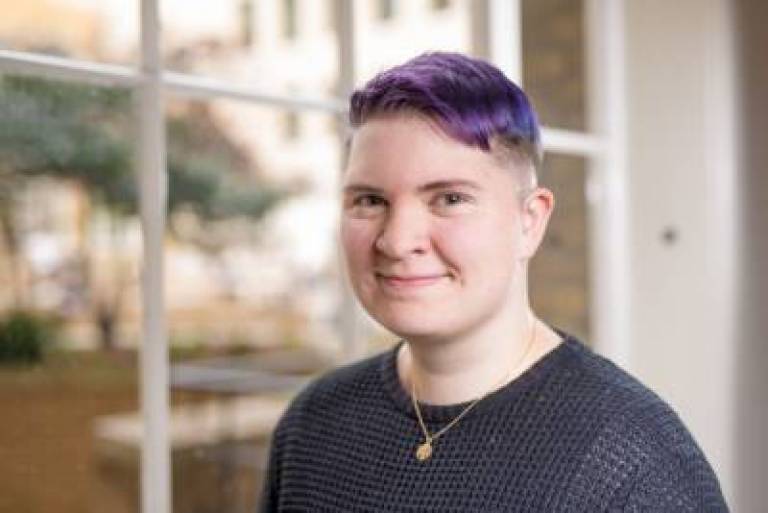Scientist Spotlight: Dr Seb Groh
1 December 2021
My favourite thing about the department & UCL as a whole is how international it is. I love teaching, students come from all over and many different backgrounds and it brings an incredible joy to teaching. What I love about the department is how interdisciplinary it is.

Caption: Dr Sebastian Groh is a Research Associate and head of the LGBTQIA+ network at the Department of Earth Sciences at UCL.
Dr Groh's role is ‘Research Associate’ (i.e. a postdoc), but he has also been acting as a lecturer, organising and teaching two different undergraduate courses at the Department of Earth Sciences. When he's not teaching, he mostly carries out his own research and assists his PI. Both are vertebrate palaeontologists – Seb works mainly on crocodile evolution and the different methods we can use to reconstruct the evolutionary history of different animal groups. On the side, he's also the head of the LGBT+ network at the department of Earth Sciences, the co-founder of Trans in STEM (a group for trans people studying & working in STEM), and a member of LESG at UCL, the LGBT+ Equality Steering Group.Seb came to UCL in 2014 as part of the London NERC DTP, following undergraduate study in Oxford and a Masters in Sweden and the US. Seb then completed his his PhD in vertebrate palaeontology in 2018 where he stayed on in his current role.
During teaching terms, Seb spends most of his time updating lecture and course materials, doing active teaching, marking essays and student reports, and dealing with any student questions that might arise via email and meetings. During non-teaching times, it depends a little on the research that he's doing:
“"At the moment, after answering emails in the morning, I spend one or two hours reading: catching up on new papers in my field, or trying to dig deeper into some methods and understanding their fundamentals so I can adapt and use them for my own research. The rest of the day is spent juggling the different responsibilities from my job and my research. I’m lucky that I don’t need a lab to do research and can do the vast majority simply from my laptop, wrangling large datasets, running analyses and writing those up into papers. During non-covid times I also visit museum collections from time to time to examine actual fossil material".
Asked about his favourite aspect of working at UCL, Seb responded:
My favourite thing about the department and UCL as a whole is how international it is. I love teaching – students come from all over and many different backgrounds and it brings an incredible joy to teaching. I’ve also been very lucky that my then-PhD supervisors and now my PI were incredibly supportive when I came out as trans and that, thus far, my students have all been wonderful and respectful as well. I’m slowly working with others on getting that same trans-positive climate to spread throughout the rest of the department and university, although it’s an uphill battle. Another thing that I love about the department in particular is how many different specialisations we have amongst our staff and how interdisciplinary it all is. As a palaeontologist with a biology/zoology background I know very little about geochemistry, geophysics, etc. I wish I had the time to actually sit in on my colleague’s modules and learn a lot more about these things, to be honest!
After a six month break from research due to Covid where he concentrated solely on preparing and maintaining his teaching for the 2020/21 academic year, Seb is now getting back into research, and is currently working on the revisions for a paper that tells us which methods are the most accurate in reconstructing the timings of when certain evolutionary events happened e.g. when a specific family of animals evolved. He is also working on trying to reconstruct the biogeographical history of several extinct families closely related to crocodiles – when and where they evolved, and how they migrated throughout earth’s history. The aim for the future is to take the methods under use and to apply them to other organisms.
Seb grew up in Germany and first came to the UK for undergraduate study back in 2009. Returning to study his PhD in 2014, Seb has lived in London ever since.
I love London – and I miss it terribly at the moment, because everything that makes living in London great currently isn’t happening (I love going to the cinema and theatre, perusing the fabric and book shops, going out for dinner with friends and discovering the Greater London area for hikes by bus and train)!
Outside of work, Seb has many hobbies including walking and hiking, and craft work including leatherwork and creating cosplay costumes. I love baking as well – on January 1st 2020 I tweeted my resolution of wanting to try out 50 different bread recipes through the year. I’m proud to say that I stuck with that resolution (very much helped along by the lockdown, it can’t be denied). I have several favourite places to go in London – currently I’m doing a lot of walks in Fryent Country Park which is within walking distance for me. During non-covid times I love going to Foyles, the large bookshop, and head to my favourite chocolate café, Saïd. I also used to do historical fencing (HEMA) once a week before covid struck. One of my best friends and I also love to go to the aquarium together and watch the sharks for hours!
You can find out more about Seb and his work on his Academic Profile, and about the Earth Sciences LGTBQIA+ network on the department website.
 Close
Close

